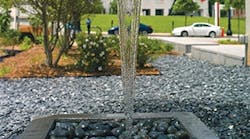As a pilot project for the Sustainable SITES program, Perkins+ Will’s Atlanta office at 1315 Peachtree Street transformed the entrance to a 1980s-era building into a spectacular, 10,000-square-foot outdoor space that invites the public to occupy a comfortable, tree-shaded plaza of sustainable landscaping.
The firm’s leadership wanted to demonstrate its commitment to sustainability not only by the project’s LEED Platinum-certified building, but also the land on which it is located. However, the compact urban site presented unique challenges during the certification process, according to Alexander Stewart, LEED AP BD+C at P+W’s Atlanta office.
“We were really limited in the kinds of credits that we could achieve,” Stewart explains. “We didn’t have vast areas to do urban agriculture or huge habitat zones. We just didn’t have the room for that and in some sense we felt crippled by it. We had to regroup and ask what is achievable and what is feasible.”
In spite of its frustrations, P+W designed the site as sustainably as possible within the parameters it faced. While performance data isn’t yet available for most SITES projects, P+W gathered its own. As part of a Land Performance Series study conducted in partnership with the University of Tennessee through the Landscape Architecture Foundation, the project’s performance data revealed a number of significant benefits:
- Reduces stormwater runoff during a 1-inch storm event by 60% compared to the site’s previous condition, preventing 18,036 gallons of stormwater from entering the city’s combined sewer system. This avoids a projected $63,126 in future capital costs for upgrades to the city’s stormwater infrastructure.
- Reduces the project’s total potable water demand by over 225,470 gallons per year, saving over $1,841 by using harvested rainwater for irrigation, the site’s water feature and wastewater conveyance.
- Sequesters 655 pounds of atmospheric carbon and intercepts over 2,251 gallons of rainwater annually in the project’s 11 new trees.
- Saves an average of 7,118 kWh and $72,084 per year by reducing site lighting power density (LPD) to 85% below ASHRAE’s maximum allowable LPD.
An Urban Landscape Challenge
Perkins+Will Office | Atlanta, GA
Certifying a 20-Year-Old Building
Tuthill Corporate Headquarters | Burr Ridge, IL
Accommodating a Desert Climate
Pete V. Domenici U.S. Courthouse | Albuquerque, NM
A LEED-Inspired Model for Landscapes
Pete V. Domenici U.S. Courthouse | Albuquerque, NM

